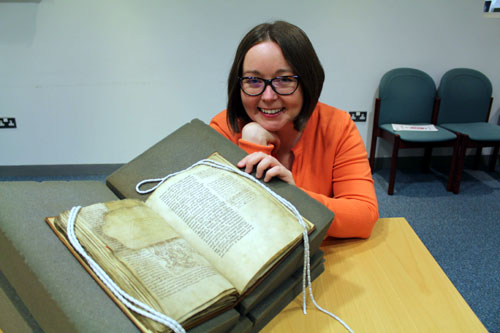AN ACADEMIC claims an important manuscript thought to be from England actually shows Scotland’s lost literary culture.

The 12 century copy of Boethius’ “Consolation of Philosophy” was always held to be English, with Durham as the most likely city of origin.
However a visiting academic from Oxford University has argued it is unmistakably Scottish.
Dr Kylie Murray, a British Academy Postdoctoral Fellow from Balliol College, Oxford, said it proved that Scotland’s literary and intellectual cultures were flourishing at a far earlier date than first realised.
The ‘Consolation of Philosophy’, thought to have been written in 524 AD, was medieval Europe’s best known intellectual text. It was held to be second only to The Bible.
Composed by Roman statesman Boethius whilst he awaited execution for a crime he did not commit, it discusses free-will, fate, and the idea of the wheel of fortune.
The University of Glasgow’s 12th century copy was found in their special collections department by Dr Murray during her research this year. It had been catalogued but was thought to be English.
Dr Murray has argued that its illustrations closely resemble the famous Kelso Charter, written at Kelso Abbey in the Scottish Borders in 1159.
The Boethius manuscript predates the Kelso Charter by a generation. It dates to c. 11.20-11.50 AD.
This means it is now considered to be the earliest example of non-biblical figurative illustration from Scotland. .
It also contains a reference to the Scottish King David I.
The words: ‘David, by grace of god king of Scots’ can be seen added alongside the text.
It is a feature commonly found written on David I’s legal documents, and many of the scribes for David I came from Kelso Abbey.
Dr Murray said: ““By showing us how alert and alive Scotland was to literary and intellectual influences from Europe at such an early date, the University of Glasgow’s Boethius manuscript is a hugely exciting find.
“ Not only for scholars of medieval Scotland, but for anyone interested in understanding the roots of Scotland’s literary and intellectual culture.”
Congratulations
Jeremy Smith, Professor of English Philology and Head of the School of Critical Studies at the University of Glasgow, said: “Dr Murray is to be congratulated most warmly on this fantastic discovery.
“It opens up a whole new chapter in Scottish cultural history. The importance of Boethius’s book for medieval and early modern studies cannot be overestimated.”
Dr Murray’s research also found the manuscript’s handwriting and illustrations did not match those of Durham, or other English books, from this period.
A spokesman for Glasgow University said literary scholars of Scotland had until now focused on the fifteenth and sixteenth centuries and, due to a lack of evidence, had presumed the culture did not exist